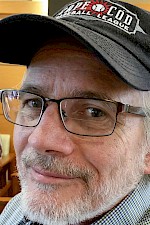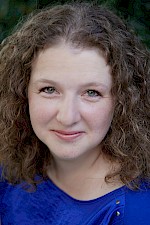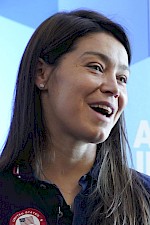Webinar
Virtual Conference - Why, What, When, and How: Using Technology in Applied Sport Psychology Practice
Webinar Archive
If you already purchased this webinar, you can access the archive.
Otherwise, you can register for access to the archive.
Keep your confirmation email(s) as CEU documentation for AASP webinars and virtual conferences.
Description
Click here to register & watch the webinar.
If you already registered and would like to watch, click here.
Session length is 3 hours.
Speakers
Peter Fadde, PhD, Southern Illinois University
Melissa Hunfalvay, PhD, CMPC, RightEye, LLC
Inna Khazan, PhD, Harvard Medical School
Lindsay Shaw, EdD, CMPC, United States Olympic Committee
Overview
As technology has continued to advance, practitioners are utilizing technology in new and creative ways to train performers. Staying up to date on the most recent applications is vital for practitioners who utilize technology within their performance psychology practice. A recent issue of the Journal of Sport Psychology in Action called to highlight advances in the field as technology has become increasingly incorporated into performers’ lives (see Watson & Coker-Cranney, 2018). Thus, the purpose of this Virtual Conference is to learn from experts who integrate technology within their practice. While not exhaustive, this Virtual Conference will focus on four technologies that have been examined within the performance psychology literature including biofeedback (Gross, Bringer, Kilduff, Cook, Hall, & Shearer, 2018; Perry, Shaw, & Zaichkowsky, 2011), neurofeedback (Perry et al., 2011; Wilson & Thornton, 2017), eye tracking (Moran, Campbell, & Ranieri, 2018), and virtual reality (Fadde & Zaichkowsky, 2018). Presenters will speak to scientific and theoretical underpinnings of their work, how they utilize technology within their work, and up to date ways in which members could incorporate technology into their applied sport psychology practice.
Learning Objectives
- Understand scientific rationale underlying benefits of utilizing types of technology in performance psychology training
- Highlight practical applications of utilizing technology to enhance performance
- Learn how to take steps to incorporate technology into one’s applied practice
Presentations
How Real does Virtual Reality Really Need to Be?
Peter Fadde, PhD, Southern Illinois University
There is no more applied question in skill acquisition than whether you believe in part-task or whole-task training. Virtual Reality, as a form of immersive simulation, attempts to replicate "whole" experiences. Alternative approaches, such as Visual Occlusion, target part-task perceptual training. Peter’s talk compares these approaches for training high-performance perceptual-motor skills such as baseball batting.
Eye Tracking
Melissa Hunfalvay, PhD, CMPC, RightEye, LLC
Athletes see first. Think second. And move third. Our eyes are THE most important link in the chain to performance success. Eye tracking technology can measure how fast athletes move their eyes, giving them the advantage of quick target identification.
Melissa’s session will outline how vision can be trained, the cost and how to apply eye tracking to clinical practice for both assessment and training purposes.
Heart Rate Variability Training for Peak Performance
Inna Khazan, PhD, Harvard Medical School
Heart Rate Variability biofeedback is a powerful empirically supported tool that athletes can use to train physiological and emotional self-regulation and improve performance. Inna will discuss the concept of heart rate variability (HRV), empirical evidence for its use in sports performance, and specific skills athletes and coaches can use to train HRV, with and without specialized equipment.
Neurofeedback
Lindsay Shaw, EdD, CMPC, United States Olympic Committee
Lindsay will review published literature on neurofeedback interventions with performance populations such as athletes, surgeons, dancers, and musicians. She will then contextualize what the neurofeedback training paradigm means in the context of mental skills training. Finally, Lindsay will share her professional insights about what works and discussing models for integrating neurofeedback training into your applied practice.
CE Credit
This program has been approved for 3.0 hours of CE to partially meet the continuing education re-certification requirement for Certified Mental Performance Consultants® (CMPC).
Program Format
You can attend an AASP virtual conference from your home or office. All you need is an internet connection. You can see the presentation slides on your computer or mobile device, and listen to the audio through your device or by calling in with a phone. Registrants will be provided with login information the day prior to the session. The webinar will also be archived for those who wish to watch it at a later date.
About the Speakers
 Peter J. Fadde, PhD is professor and director of the Learning Design and Technology graduate program at Southern Illinois University. He researches training of perceptual and decision skills in high-speed, high-stress performance domains including military and sports. Dr. Fadde’s e-book The Sixth Tool: Training Baseball Pitch Recognition is available on Amazon. Peter consults with major league and college baseball teams and is Chief Science Officer of gameSense Sports, LLC.
Peter J. Fadde, PhD is professor and director of the Learning Design and Technology graduate program at Southern Illinois University. He researches training of perceptual and decision skills in high-speed, high-stress performance domains including military and sports. Dr. Fadde’s e-book The Sixth Tool: Training Baseball Pitch Recognition is available on Amazon. Peter consults with major league and college baseball teams and is Chief Science Officer of gameSense Sports, LLC.
 Melissa Hunfalvay, PhD, CMPC is a former professional tennis athlete, internationally recognized coach, scientist, co-founder of RightEye. As a professional coach she worked with a dozen male and female athletes ranked in the top 20 on the world junior circuit including Wimbledon and US Open junior champions. She has consulted for teams and individual athletes in the NFL, NHL, NBA, MLB, PGA, ATP, WTA as well as Military Special Forces, Special Operations Command, and other professionals including police officers, brain surgeons and astronauts.
Melissa Hunfalvay, PhD, CMPC is a former professional tennis athlete, internationally recognized coach, scientist, co-founder of RightEye. As a professional coach she worked with a dozen male and female athletes ranked in the top 20 on the world junior circuit including Wimbledon and US Open junior champions. She has consulted for teams and individual athletes in the NFL, NHL, NBA, MLB, PGA, ATP, WTA as well as Military Special Forces, Special Operations Command, and other professionals including police officers, brain surgeons and astronauts.
 Inna Khazan, PhD, BCB is a clinical psychologist specializing in health psychology and performance excellence training using biofeedback and mindfulness-based approaches. She has conducted biofeedback and mindfulness trainings for notable institutions in the US and abroad, including the US Navy Special Warfare, US Army Special Forces, and the Stuttgart Opera and Ballet Company. A Harvard faculty member, Dr. Khazan is the author the highly-regarded Clinical Handbook of Biofeedback: A Step-by-Step Guide to Training and Practice with Mindfulness.
Inna Khazan, PhD, BCB is a clinical psychologist specializing in health psychology and performance excellence training using biofeedback and mindfulness-based approaches. She has conducted biofeedback and mindfulness trainings for notable institutions in the US and abroad, including the US Navy Special Warfare, US Army Special Forces, and the Stuttgart Opera and Ballet Company. A Harvard faculty member, Dr. Khazan is the author the highly-regarded Clinical Handbook of Biofeedback: A Step-by-Step Guide to Training and Practice with Mindfulness.
 Lindsay Shaw, EdD, CMPC is a Senior Sport Psychophysiologist at the United States Olympic Committee. She serves as a sport psychologist and psychophysiologist meeting the performance and clinical needs of both summer and winter National Team athletes. She utilizes brain computer interfaces, brainwave stimulation, sleep assessments, heart rate variability interventions, and other novel approaches in her work with elite athletes. Dr. Shaw is intrigued by the prospect of identifying psychophysiological markers for elite performance.
Lindsay Shaw, EdD, CMPC is a Senior Sport Psychophysiologist at the United States Olympic Committee. She serves as a sport psychologist and psychophysiologist meeting the performance and clinical needs of both summer and winter National Team athletes. She utilizes brain computer interfaces, brainwave stimulation, sleep assessments, heart rate variability interventions, and other novel approaches in her work with elite athletes. Dr. Shaw is intrigued by the prospect of identifying psychophysiological markers for elite performance.
Registration
Cost: Free
Register to access the archive




